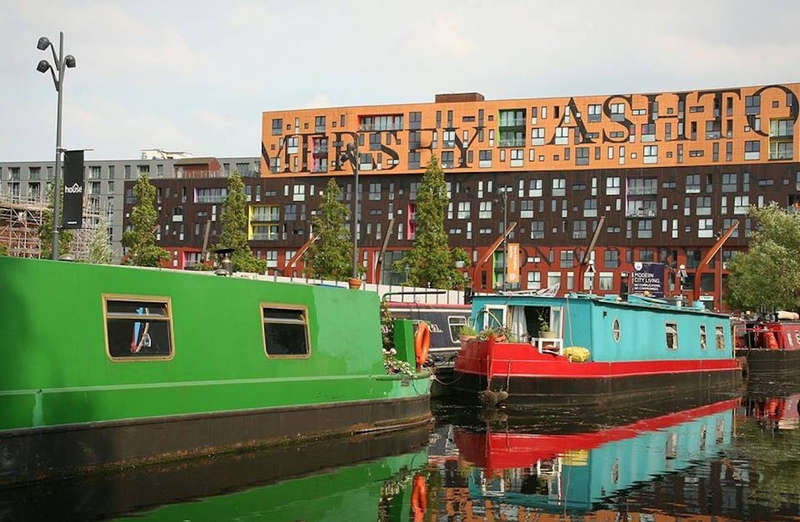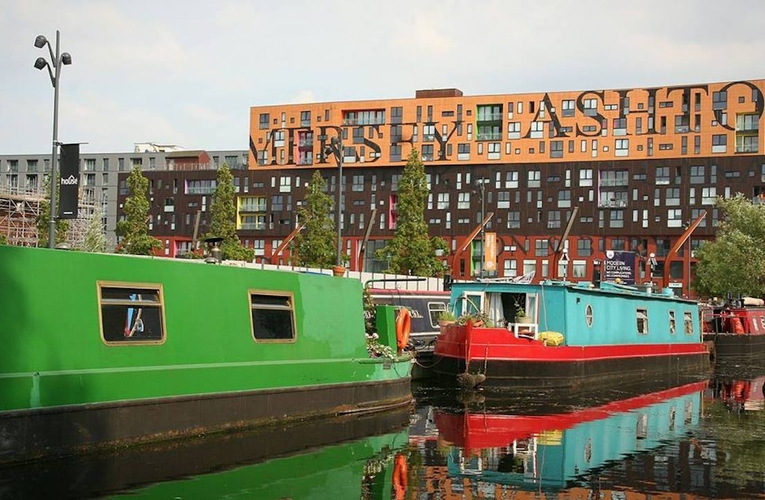As two eviction controversies rage Confidential asks: what is this myth about 'social cleansing'? Can your home be at risk simply because of who you are?
Time was when Tom Bloxham was the future of housing in Manchester. With those made-over mills and funky little prefabs his Urban Splash company led the way in re-imagining city living. It's fifteen years, now, since the town fathers handed over half of Ancoats to the former Affleck’s poster salesman; his to refashion, seemingly as a giant set for a children's TV programme...all cute lines, fizzy colours and designer touches. Bloxham was Lord Belborough. Then, as you might say, the wind changed, the heavens shifted, the mortgage lenders overstuffed the slot machines, and the world financial meltdown pissed on his Chips building.
What now for housing and the regeneration industry? Is the wind set to change once more? As the repercussions from the Grenfell Tower blaze begin to be felt, and the nation teeters between continued austerity and nostalgia for an age of social provision, Manchester is on the front line of the debate about the way to match people with homes. Those squat protests at Cornerhouse, Hotspur Press and the Hippodrome in Hulme have been difficult to miss. So is the system really broken? Right now it seems that just as the ideal of social housing was soured by the concrete sky dreams of city planners; so the human costs and corners cut by certain developers have thrown into question the notion of property as our economy's accelerator.
Among the charges levelled against the status quo, one in particular has been revived: that of the supposed scourge of 'social cleansing'.
But is it a myth or a reality?
'Social cleansing', of course, was the claim when the homeless village was being blown about the city a couple of years back, prompting the council to step in and ban the use of tents. As a commentator noted: "People don't want to be confronted by the sight of the homeless. They're willing to deprive those people of their last opportunity to sleep in order to protect themselves from this discomfort."
We'd heard it when the old Cardroom estate was knocked down to make way for the New Islington development in the first place. Ancoats resident Jackie Hutchins was in no doubt as to the sentiment behind the Compulsory Purchase Order which dropped through her letterbox one morning, demanding the sale of the home she had lived in for 42 years. "It's like they want to wipe us from the face of the earth," the former Durnbridges shop manager said. Forced out to Openshaw she recalled ruefully the regeneration projects which have uprooted and scattered communities across northeast Manchester. "At bonfire night on the estate Bloxham was the guy," she attested. "His old friends from Affleck’s gave us the photo for his face."
It's a charge which seethes regularly in the pages of the Salford Star, as waves of evictions have been served on council properties in Broughton, Seedley, Langworthy and Pendleton. For editor Stephen Kingston, reports that the 'New Broughton' development sought to redress the balance of "economically inactive" residents exposed exactly who is wanted to fill housing stock in today's world: consumers as opposed to communities. Accordingly, housing association Sallix are "working to change the view that social housing is a home for life"; 'assured' rather than 'secured' tenancies make evictions easier. In the shadow of the Vimto Gardens development, Islington estate resident Sarah Millar has campaigned for her local newsagent, which she feels is the last line of defence against the wrecking ball. "Mo's shop has served our community for thirty years," she says. "If he goes, we will be next."
This summer, two controversies have served to further amplify the issue, locally. A mere decade after the Cardroom estate was cleared, New Islington's placid new marina is at the centre of a fresh storm. "Life can be very pleasant here," says Jane Williams of the peaceful inner city spot where she and partner Martin have been happy among a particularly close knit community. That spot, of course, was designed as the centre piece of the Urban Splash development there. Set back from Old Mill Street it’s a picnic of a location at the heart of a blooming quarter. "A natural environment," she nods. "You've got geese, swans, bats flying about in the evening...for Manchester city centre this is beautiful."
All that was shattered in May when a letter was left in each mailbox at the marina's boating hut. "'Dear Sir or Madam' in a plain envelope," Jane recalls. "No name. Signed by Eddie Smith, the council officer for strategic planning. So they can find our names for council tax but not for this." It gave notice of the intention to evict. Ostensibly the reason is repairs due to leaking infrastructure. But with a hard-to-believe two year completion time attached to the job, and the standard practice of double mooring to allow work to go on around not taken up, Jane is in little doubt of the real motive behind the move.
"Now that we've served a purpose in making the place look nice they want us out"
"They want the Cheshire set in," she says. "They want nice, shiny, painted boats like they get at Prestonbrook, where well-heeled people, who actually live elsewhere, use narrow boats at the weekend." With the newly built Manchester Life apartments overlooking the scene, the Waterside Cafe touting for trade, and the Yo Sushi homes project also in the pipeline, there's a lot more money in the neighbourhood than just a year or two ago. "Now that we've served a purpose in making the place look nice they want us out," Jane reckons. "They think they can make the place look better."
It may or may not be relevant that according to Companies House, Eddie Smith, the signatory of that council letter, became a director at Manchester Life just a month before he sent it.

There's an LGBT community at the marina. And as with every eviction the consequences are manifold and potentially life-changing. "People here feel secure walking back to a safe environment after a night shift in the city centre who don't feel the same way about taking the night bus back to Droylsden." Then there are businesses which stand to be affected. With no confirmed place to go Jane and Martin's street food business will be threatened if they're unable to find a viable alternative. Other residents will inevitably have to choose between job and home, with couch surfing on the cards for not a few. At the initial town hall meeting, housing chief Bernard Priest attempted to show sensitivity with regard to the issues. "Eviction is a very emotive word," he told the people he is evicting.
As for Urban Splash, the mess with the infill, the coping stones, and the grading, which have caused the ubiquitous leaks, threatening nearby properties and holding up construction work on new ones, will mark the end of their spell in charge of the marina's management, with the council taking back the reins on August 31. That was originally the date the residents were due to be out, until a recent stay-of-execution pushed back the eviction until next spring, as the council begins to back pedal in response to local feeling. "I don't know what we'll do," says Jane, of the future from here. "We're second class citizens. They haven't seen us as a community. They haven't seen us as residents. To them we've been nothing more than a bunch of boats."
In a tortuous case which has baffled onlookers Cae has been pursued from court to court...
In Hulme, meanwhile, 2017 has seen the culmination of the long term legal soap opera surrounding the erstwhile Cae Gests, Esq., better known to shipmates, thanks to the convenience of the deed poll system, as Captain CaeOs. Like the last pirate in the last outpost of old Hulme, the Bentley 'Redbricks' estate, for Cae things took a turn a couple of years ago after he refused a request from housing association One Manchester to remove an untaxed van. A court order was obtained and the vehicle towed, but the management company followed up with a bombshell: we want to sell your flat. And that's when things got more than a little bit messy, as Cae was not simply a tenant but an owner-occupier under the right-to-buy scheme, and reportedly up to date with his finances.
If you'd have thought that would protect him from eviction you'd be wrong.
In a tortuous case which has baffled onlookers Cae (pronounced 'Kay') has been pursued from court to court over the fact that he has knocked through dividing walls in the property - a renovation which many on the estate have carried out, with and without permission, as the housing association well know, says residents' spokeswoman Lucy Williams. That would appear to be a crucial point. The fact that One Manchester have resolutely refused to discuss the matter with the residents association, instead commissioning a hotly disputed survey and demanding £60 000 worth of repairs, has led to a prolonged enactment of distress. When Cae argued that the alterations had been made before he bought the flat - the council were more than happy to sell it to him in that condition - his view was initially upheld. Higher courts have found otherwise. In March, an order was obtained securing repossession of the property unless Cae was able to sell it privately before June 20.

It was at this point that Confidential was enlisted, after it was suggested that having forced Cae to sell his home, the housing association were making it difficult for him to do so. Obviously, they stood to gain possession of the property if he failed. Sixty thousand pounds worth of improvements to be made by any prospective buyer? Within three months of purchase? Lucy Williams was suspicious. The estate agent we spoke to was of a similar mind. That seemed like quite a hoop to jump through. Confidential decided to ring One Manchester posing as an interested buyer, to find out just what were their terms and conditions, exactly? With just two weeks to go before the possession order came into effect we spoke to Bentley estate place manager Barry Seers at the housing association's Hulme office, who told us we were not to discuss the matter with anybody but him.
'Could you email your terms and conditions for the purchase of Cae's property on Humberstone Avenue?'
Barry said he'd do so right away. So we put down the phone and waited for the details to drop into our inbox.
Time passed. Time enough for Barry to have a large brandy and a cigar in his office. And then time enough again for him to have another.one. Morning became afternoon. Tuesday became Wednesday. Wednesday turned slowly into Thursday. There's a way of looking at this that says running down the clock on a man's welfare is every bit as dangerous as flouting building regs. So with Cae now two days closer to the street and One Manchester due to take possession in just twelve days’ time we rang back.
"Hello Barry. About Cae's flat. You were going to send the details..?"
This time Barry had changed his tune.
"Sorry, you'll have to speak to our barrister."
"And when would that be possible?"
"He's on holiday at the minute."
Hundreds signed up to protest the outrage that a Manchester housing association could force a home owner into destitution
As it transpired, Barry had evidently been clever enough to realise that what he was up to might be of interest to a journalist - so he'd googled and discovered that he had indeed been speaking to one. Unfortunately, he was then careless enough to brag about this to the lady from the residents association. When she notified him that she too was interested in purchasing the property, he didn't get back to her either. Meanwhile the man whose flat One Manchester was set to acquire, whose own interior design seems as chaotic and open plan as the home he's losing his grip on, had resolved to take to the roof when the day finally comes. "I’ve nowhere else to go!" There would be those who might choose this point in our tale to take a snapshot of just how clever our once proud social housing providers have become. As clever as Barry Seers, they might say. One step ahead of the game. Using his formidable sixth sense, it might seem, to weed out potential buyers of a £130 000 property not his to sell.
"The thing is, Barry's usually one of the good guys," said Lucy. "He just seems to have a bee in his bonnet about Cae."
It was then that the story began to turn on its head. Cae filmed a video appeal and a petition was raised on the basis that One Manchester was forcing him onto the streets. "I'd like to tell you about Captain Cae0s and his wonderful adventures in Hulme..." he began. Hundreds signed up to protest the outrage that a Manchester housing association could force a home owner into destitution. But then a member of the public came forward to say that she had offered Cae a huge sum for the property: enough, by his own admission, she said, to leave him with tens of thousands in the bank. Not quite so destitute, then, perhaps. Without telling a soul Cae had quietly turned down the offer. He'd elected instead to stand and fight.
The deadline approached. The estate agent had de-listed the property, washing its hands of Cae after he misled them over the conditions attached to the sale. Shelter, who had seemed strangely to be keeping Cae at arm's length, now sent desperate last minute emails imploring him to apply for extensions to his court order before he was thrown out of his home. Cae just scoffed. He seemed not even to be trying. Like he’d given up, or dug in. Maybe a journalist would get him out of it? Perhaps he was readying to squat the place. One Manchester, for the time being, stayed their hand. Good days were marked by the drone of loud music issuing from the upstairs flat. The underlying defeat was, one inferred, aspirated in dwindling blocks of resin crumbled to dust.
"If people hoarded food because its value was bound to go up when others starved, we would stop them"
One night, as the publication of this article neared, Cae held court. As the drinks flowed and he expatiated in his familiar jags of paranoid syntax about the abyss he had been unfortunate enough to fall into, there was a last meal atmosphere to the proceedings. Around us his home, his pirate ship, was indeed like a projection of his mind, like when they give LSD to spiders and you see it in the webs: knocked-through and scattered with freight. As with the grizzle about his features you could read into it the whole two year tale as he saw it: of being singled out; of facing the loss of the home he’s lived in for nigh on twenty years; of being profiled as an undesirable element; of being the victim of spurious assessments; of being unable to afford legal help; of being billed for attempting to defend himself; of having his home declared unsafe, seemingly only as a means to evict him and with no attempt to make it safe; of being tormented, day and night, by the effort to displace him.
And then there was a bombshell, and one or two things fell into place. Recalling the roll call of housing officers, councillors, politicians, estate agents and others who had participated, or been petitioned to participate, in the tale of his un-housing...from Barry Seers to Shelter to Lucy Powell to Andy Burnham, seemingly...his words were little more than a spit gun of cussed defiance.
"I've threatened the life of every man and woman who's been involved in this," he disclosed. And he was proud of it. He was a-glint with buccaneering zeal.
'Did you threaten them with a cutlass, like a real pirate, or did you email them?' Confidential wondered.
Cae sucked on his beer. He took out a piece of paper and produced a pen, and we began to go over the load-bearing walls lie once again.

High on a lost sea of truths, half truths, untruths, home truths, debt, paranoia and legal snares, and in spite of every inducement to take some money and run, he’d chosen all this in preference to being moved on. Because Cae is clinging, even as the current drags him under, to the most solid fact to be found amid the floodwaters that are washing him away: that it is unjust and inhumane to take his home from him. And of course, he's been right about that all along. Bernard Priest or Barry Seers won't fix the problems in Cae's head by taking his home off him, and if they're honourable men they will recognise that and use their influence to achieve a better outcome. Those two men have the opportunity to be heroes against homelessness now, lest there be any stain deriving from the eviction of the renowned Mr Cae0s, Esq. Better known to his many friends as Captain Cae0s.
As one experienced housing association official put it: "What does it cost to put in a couple of walls? Can't we put a shout out for a brickie?" We could perhaps throw in some counselling, and recall that far from being a social menace, Cae is popular with the majority of his neighbours for the many kind deeds for which he’s well known. Such people build communities, not necessarily from rational stuff.
He currently does not have a buyer, and appears vulnerable in many senses. He does indeed now genuinely face the streets.
However or whenever Cae's indulgences began, the perception that can be drawn from the targeting of one individual is stark: if we don't like you we can find a reason to bust your door down and drag you into the street. His reputation as an irritant and an agitator for self-management on the estate has evidently gone before him. Residents told a familiar tale: “They stepped up oversight on the estate…” “They tow travellers' vans away, now they’re towing Cae away...” “They want the flat to let at market value...” “People are being judged against the value of their homes…” Whatever the truth of these things, with the deadline passed and extensions elusive this complicated saga seems to be creeping towards a denouement. Cae, an anarchist man-child of pensionable age, as much at war with himself as he is with the world, has appeared to react to his eviction in the manner of a protracted breakdown. He currently does not have a buyer, and appears vulnerable in many senses. He does indeed now genuinely face the streets.
Cae is just one of untold many to be faced with the horror of losing their home. But is talk of 'social cleansing' not simply hysteria? A straightforward consequence of progress, due process and market forces? One planner well used to working with councils and other bodies cautioned against seeing skullduggery where in reality there is none. "Often these things just reflect a lack of engagement and consultation. Talk of conspiracy theories just gets in the way." Contacted at the town hall Bernard Priest took exactly the same line. “To use the term ‘social cleansing’ is completely inappropriate as it implies some kind of deliberate discrimination, which is unjust. However, it would be disingenuous to suggest that the housing systems in place around welfare reform and other austerity measures don’t make it more difficult for poorer and vulnerable members of society to find decent homes, and one outcome is that those in need of support can be limited in terms of where they can afford to live." On the marina issue, Priest has vowed to do more, as the council belatedly back-pedals; asked about the Redbricks affair, he declined the opportunity to comment by disingenuously suggesting that “the council are not involved" - conveniently sidestepping the fact that he is chairman of the board of directors at One Manchester. The people of the Redbricks will assuredly be close to his heart, then.
Shelter would not be drawn on such a politicised issue as social cleansing. Greater Manchester Housing Action, who have called on One Manchester to stop behaving like a "shark landlord" are clear on the matter: "Social cleansing is happening across Greater Manchester, with residents being forced out and communities facing destruction. Houses are homes, not assets, and we need a housing strategy that reflects this." Manchester Shield's Adam Prince, meanwhile, went off like a property firework at the mere mention of the phrase. "Landbanking! Section 106 commitments! Multiple directorships! Vanity projects! Leese!"
The key work on the housing crisis in recent years is Danny Dorling's 2014 book All That Is Solid. In it, the Oxford professor argues that the root cause of the problem is inequality, and that contrary to the claim that there is an affordable housing shortage there have never been more beds or units per head of population. ("11 000 empty properties in Manchester!" scream posters to be found around the various squat sites). Instead, since the great social housing sell-off, governments have allowed the market to become open to speculation, with interest rates kept low to sustain the situation. Thus, as some accumulate, others are decanted by the system into smaller and smaller units - aided and abetted by the housing benefit cap and the bedroom tax - into such places as Grenfell Tower, or onto the streets. The widening equality gap, therefore, has no greater expression than in shelter. As Dorling's book declaims: "if people hoarded food because its value was bound to go up when others starved, we would stop them."
'...the structures of our housing system are innately discriminatory'
The truth about social cleansing is that it is bound up with perception, and perception can run endlessly deep. You can read into the above account whatever you're so inclined. It's largely perceptions that holds society together, though, and the perception appears to be on the rise that the structures of our housing system are innately discriminatory. We might some of us agree that Hulme needs its anarchists. As we need our local shops. As the city needs its LGBT community. As we needed the punks in the old Ducie Arms. As we need the bikers in the Salutation. And even the cider heads in All Saints Park, sort of. We need a wide social mix in the communities in which we live: of age, gender, lifestyle and class...we need these to have a society, rather than an episode of Trumpton. Surely every tenth home should be a pirate ship, at least in old Hulme? Can we really not put a shout out for that brickie? Bernard? Barry?
As house prices and rental values soar tenants and residents are subject to ratcheting pressure from the market place. The heat is felt in many quarters, and since the tragedy in London the sense of it has grown: that that wind which blows the homeless village around could come and blow you around. When the report into the Grenfell Tower tragedy is finally presented many expect there will be a rethink of the way we do housing in this country...with its foreign money, asset bubbles, buy-to-let bonanzas, no fault evictions, cosy public-private partnerships and homes done cheap as Chips. The age of Urban Splash, as we have known it, will be up for review.
Danny Moran
You might also like:
Gary Neville: a new type of developer?
The biggest Manchester redevelopment plan ever
Friedrich Engels' return: right or wrong?
Additional thanks: Justin Webb (Shelter), Vicky Payne (URBED), Steve Millington (MMU), Richard Searle, Adrian Slatcher, Niki Cleary, Syd Far-i.















